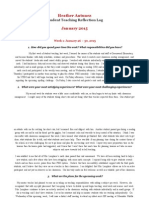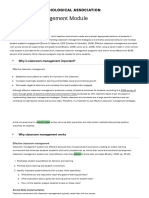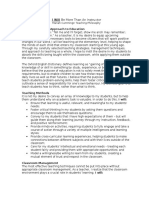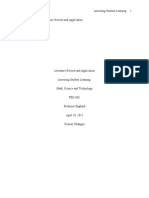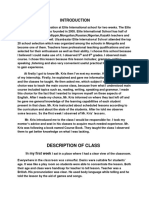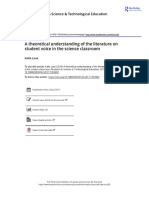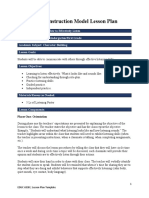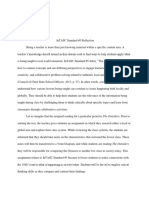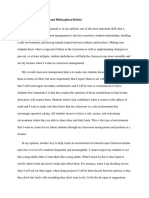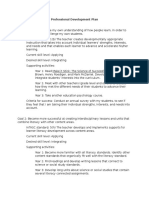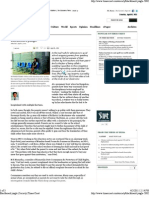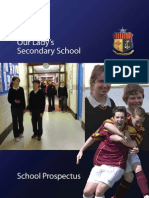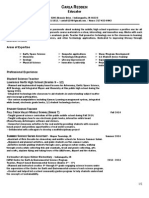Professional Documents
Culture Documents
Psych Final
Psych Final
Uploaded by
api-245810041Original Title
Copyright
Available Formats
Share this document
Did you find this document useful?
Is this content inappropriate?
Report this DocumentCopyright:
Available Formats
Psych Final
Psych Final
Uploaded by
api-245810041Copyright:
Available Formats
Personal Reflection
Ellen Schlueter Personal Reflection Educational Psychology PSY 301N December 3, 2013
Personal Reflection Personal Reflection Beginning this semester I had many strong opinions about teaching, my own particular classroom, and the application of psychology to education. Now at the end of Educational Psychology I have changed my views on some ideas of how I want my classroom to operate, opened myself up to trying to apply psychological studies to my classroom, and most importantly I have opened my mind that there are many different ways to teach well, and for students to learn well. By interviewing a teacher I was able to see how the principles of
psychology we studied in class manifested themselves in a real classroom. I was able to see one way that a teacher reaches her students. I choose my mother to interview, because she is a woman and teacher that I respect very much. Though I was her student for two seven-week classes, and have grown up with her, I did not know who she was as a teacher behind the scenes. By interviewing her I was able to see how she operates her classroom so that it is the best learning environment for her students. One of the most important things I learned from this interview process is that it took time for my mother to be comfortable organizing her classroom. In the beginning, she said she had a whole list of rules for her classroom, but now she only has one. I am sure that she had whole lists of how she was going to do what, but over time she has been able to simplify them and has figured out what works in certain situations. In asking questions about continued learning, I found that Mrs. Schlueter does not do any formal research in her classroom, but tries new ideas often in her classroom. She heard that the people who are talking the most in a classroom are learning the most. So at the beginning of one of her classes she implemented turn and talk. This is where the students turn to one another and talk about what they just learned. This is a great example of taking time out of the regular
Personal Reflection schedule to try something new. I often like to do things the same and do things that are guaranteed to be successful. This question and answer shows me the importance of changing things up so that you can continuously be improving classroom instruction. If an experiment works keep it, if it does not learn from it. Mrs. Schlueter has continued her education formally, but also within her school. She is in a group of teachers that shares ideas and challenges one another. Continued learning for teachers was shown to be very important to improving
Americas educational system. As a teacher I am going to use my colleagues to ask for ideas and advice about how to continuously improve my classroom, and learn about new studies like the one that showed those who are talking in a classroom are the ones learning the most. Lev Vygotskys Zone of Proximal Development was very important to how Mrs. Schlueter interacts with her students. She links the ZPD to her the students readiness to learn the material to be taught that day. She can clearly recognize those students that are not quite ready, the majority that are, and those that are past the current material. From Mrs. Schlueters response, I realized that though the main content of a lesson may be taught to the majority of students who are in the same ZPD, a teacher needs to use supports and challenges for the students that are outside of the ZPD. In viewing myself as a future teacher I my past beliefs were that I have to be fair, that all my students must be treated the same or else they would complain. I now know that differences in teaching are a part of most classrooms, and that all of my students are different and so it would be unfair to treat them all the same. Some examples that Mrs. Schlueter gives that I plan to use in my future classroom are that she provides supports, such as extra attention, encouragement, and starters for students not yet ready, and gives challenge projects to students that are beyond the current material.
Personal Reflection
Mrs. Schlueter has two goals for the development of students in her classroom. They are that the students learn respect for one another, and that they become successful independent thinkers. These are both great goals that address the stage of development that her students are in, which is 11-14 years old. If students are able to respect all of their peers and themselves, they will be able to find their identity, which is what Erikson said students would struggle with at this age. Also, students that follow societys guidelines for respect are in the Postconventional level of Kohlbergs moral reasoning. By teaching students to be successful independent thinkers, teachers teach students to be resilient, to be problem solvers. As critical problem solvers students are in Piagets last stage of development, formal operational. Project-based learning is widely successful in classrooms and I know from learning about it in class and from the interview that I will use project-based learning in my classroom. From interviewing Mrs. Schlueter whose classroom by the very nature of her content is almost completely project-based, I heard about the successes of project-based learning. Because the students work on projects on their computers they are constantly practicing skills they have been taught, are able to use creativity, have to use problem solving, and enjoy what they are doing. In mathematics a typical lecture style is used in most classes. I have been in classes that have tried to use project based learning, but it was not organized well, and as a student I felt my time was being wasted instead of being excited for the learning opportunity. After learning about how well project-based learning can help students remember content, and take responsibility for their learning, I want to make good projects that the students will be interested in and make them more excited about mathematics. Project-based learning is also a great way to utilize cooperative learning. Students in different ZPD can work together to challenge and help one another.
Personal Reflection One of the most surprising topics discussed with Mrs. Schlueter was the school wide reward system her school has implemented. It follows along the lines of the theories of BF Skinner, who said animals will repeat a certain behavior if positive stimulus occurs. At West Branch High School the reward system provides the positive reinforcement of slushies, but the students also receive the positive stimulus of the teachers attention, the principals attention,
their parents, and most importantly their peers attention. By rewarding good behavior the other students will see the good behavior and model it, as Albert Bandura explained. The other students will want the reward also, and students who did not know how to behave and respect their peers will be able to see what is expected of them. What I love most about the positive reward system is that it changes the attitudes of the students, the teachers, the principal, and the parents. No longer is the teacher just keeping her eye out for trouble makers, but instead is looking for those students who do follow her rules and are extra helpful. Students attitudes change because no longer do they just do what is expected of them but they are challenged to do exceptionally good behavior, looking out for the needs of those around them. One example Mrs. Schlueter gave me is of a student who killed a spider that fellow students were afraid of. This particular student stood up, killed the spider, threw it away, and sat back down without a noise. Mrs. Schlueter was so thankful that the whole class was not disrupted by what could have turn into an obnoxious show of screams and taunting. Needless to say this boy received a slushy. Also, the reward gives students a good attitude toward school and makes school a more exciting environment, which Pavlov shows to be important to students physiological reactions. Another student Mrs. Schlueter told a story about was a boy who earned a slushy, and then his name was drawn to play music the next day. His reaction was disbelief saying this was the best day he has ever had, because he was recognized for doing something good and he always does good things,
Personal Reflection he had a slushy, and now he was going to be able to play his favorite music the next day. These are the kinds of students teachers want to teach, the kind that are excited about school, and have their best days at school. This example so clearly showed me the importance of psychology for schools, because something as silly as rewarding students with slushies can change a whole school. I have learned many important psychological theories and educational strategies to implement in my future classroom. One of the most important qualities I need to have as a teacher is intentionality. Intentionality is key to a successful classroom, because though I have learned many new teaching strategies, if I do not implement them into my classroom intentionally, they will not be successful. I have experienced many of these strategies as a student and have often been disappointed or felt as if I was wasting my time. As an intentional teacher I still want to fulfill my goals I had before taking Educational Psychology class, which
are challenging all of my students, making them excited to learn math, and teaching them how to be successful independent learners. After this class I have a new goal for my classroom. I want my students to feel a sense of community and responsibility for their own learning, but also for their fellow students. I want my classroom to be a team where everyone is striving for the same goal, not just me as the teacher. I know the many things I have learned in this class will help me achieve these goals.
You might also like
- 3 - Teacher Interview Reflection PaperDocument5 pages3 - Teacher Interview Reflection Paperapi-30470463367% (3)
- Transcript For Special Needs InterviewDocument2 pagesTranscript For Special Needs Interviewapi-319674079No ratings yet
- Philosophy of Teaching EDU 534Document5 pagesPhilosophy of Teaching EDU 534Dominique' BookerNo ratings yet
- Lesson Plan Reflection Nick Dotson UCR ExtensionDocument4 pagesLesson Plan Reflection Nick Dotson UCR Extensionapi-361083998No ratings yet
- Nondirective Teaching Model Lesson Plan C BurtDocument4 pagesNondirective Teaching Model Lesson Plan C Burtapi-524542474No ratings yet
- Reflection PaperDocument7 pagesReflection Paperapi-320114472No ratings yet
- MSP Lesson Plan Format AssesmentDocument6 pagesMSP Lesson Plan Format Assesmentapi-357606765No ratings yet
- Progressive Education In Nepal: The Community Is the CurriculumFrom EverandProgressive Education In Nepal: The Community Is the CurriculumNo ratings yet
- GurdjieffDocument7 pagesGurdjieffredvelvetmask2343No ratings yet
- Leaving Microsoft To Change The World Book and MP3 PackDocument7 pagesLeaving Microsoft To Change The World Book and MP3 Pack123rajesh_kumarNo ratings yet
- Educational Leadership: a Student-Centered ApproachFrom EverandEducational Leadership: a Student-Centered ApproachNo ratings yet
- Student Teaching LogDocument16 pagesStudent Teaching LogHeather Myers AntunezNo ratings yet
- Philosophy of Classroom ManagmentDocument2 pagesPhilosophy of Classroom Managmentapi-530896223No ratings yet
- Philosophy of AssessmentDocument10 pagesPhilosophy of Assessmentapi-404083519No ratings yet
- Unit Plan ReflectionDocument5 pagesUnit Plan Reflectionapi-337273832100% (1)
- Field Observation Essay DocumentsDocument7 pagesField Observation Essay Documentsapi-459828381No ratings yet
- Practicum ReflectionDocument4 pagesPracticum Reflectionapi-232255206No ratings yet
- Philosophy of EducationDocument6 pagesPhilosophy of EducationShanna OsinskiNo ratings yet
- Daily Lesson Plan: Teacher'S Name: Mrs. Azrina Binti AzmanDocument5 pagesDaily Lesson Plan: Teacher'S Name: Mrs. Azrina Binti Azmanazrina azmanNo ratings yet
- Portfolio Section 2Document9 pagesPortfolio Section 2api-519920785No ratings yet
- Kratochwill DeRoosbBlair Classroom Management Teachers ModulesDocument13 pagesKratochwill DeRoosbBlair Classroom Management Teachers ModulesМария РыжковаNo ratings yet
- Classroom Management 2Document17 pagesClassroom Management 2Ryan EchazarNo ratings yet
- Professional Growth PlanDocument3 pagesProfessional Growth Planapi-266550907No ratings yet
- Assessment.: How Can You Encourage Students To Apply Their Knowledge and Skills To Real-World Tasks?Document3 pagesAssessment.: How Can You Encourage Students To Apply Their Knowledge and Skills To Real-World Tasks?Benjie Modelo ManilaNo ratings yet
- Week 8 Lesson ReflectionsDocument5 pagesWeek 8 Lesson Reflectionsapi-300499643No ratings yet
- My Teaching PhilosophyDocument3 pagesMy Teaching PhilosophyMariah CummingsNo ratings yet
- Teaching StatementDocument2 pagesTeaching StatementSpencer PotterNo ratings yet
- Observation Lesson KindergartenDocument2 pagesObservation Lesson Kindergartenapi-284103669No ratings yet
- Reflection - Lesson PlanDocument4 pagesReflection - Lesson Planapi-349567441No ratings yet
- Assessment-Based Instruction PaperDocument7 pagesAssessment-Based Instruction Paperapi-250313253No ratings yet
- Literature Review of Assessing Student LearningDocument8 pagesLiterature Review of Assessing Student Learningapi-283267030No ratings yet
- Revised Reflection of Research On Assistive TechnologyDocument5 pagesRevised Reflection of Research On Assistive Technologyapi-284930765No ratings yet
- Field ObservationDocument7 pagesField Observationapi-534240434No ratings yet
- Responsibilities of Paraprofessionals Slide 1: IntroductionDocument16 pagesResponsibilities of Paraprofessionals Slide 1: IntroductionJean ANo ratings yet
- Description of Class: in My First WeekDocument9 pagesDescription of Class: in My First WeekBüşra SedaNo ratings yet
- Sped ObservationDocument6 pagesSped Observationapi-282105125No ratings yet
- Toxic School EnvironmentDocument2 pagesToxic School EnvironmentBernard Ah Thau TanNo ratings yet
- Ed5503 Final Project - Classroom ManagementDocument25 pagesEd5503 Final Project - Classroom Managementapi-437407548No ratings yet
- Literature-Review On CurriculumDocument16 pagesLiterature-Review On Curriculumdavid durianNo ratings yet
- Daily Reflection 1Document4 pagesDaily Reflection 1api-295119035No ratings yet
- List What You Learned About Each of The Characters in The Case. What Do You Think Is Motivating The Thoughts and Actions of Each of The Characters?Document4 pagesList What You Learned About Each of The Characters in The Case. What Do You Think Is Motivating The Thoughts and Actions of Each of The Characters?api-303230749No ratings yet
- Edug 808 Unit Plan-FinalDocument26 pagesEdug 808 Unit Plan-Finalapi-273543630No ratings yet
- Observation ChecklistDocument2 pagesObservation Checklistapi-293994881No ratings yet
- Classroom Management Action PlanDocument23 pagesClassroom Management Action Planapi-298602124100% (1)
- Observation Reflection 2Document5 pagesObservation Reflection 2api-308127819No ratings yet
- A Philosophy of EducationDocument2 pagesA Philosophy of EducationTaylorNo ratings yet
- Lesson ReflectionDocument6 pagesLesson Reflectionapi-252953828No ratings yet
- Artifact 5 - Iep AnalysisDocument7 pagesArtifact 5 - Iep Analysisapi-518903561No ratings yet
- Interview QuestionsDocument3 pagesInterview Questionsapi-295499931No ratings yet
- StudentvoiceDocument20 pagesStudentvoiceapi-236388425No ratings yet
- Portfolio Activity - Unit - 1Document3 pagesPortfolio Activity - Unit - 1Greshma MomayaNo ratings yet
- Special Education Paraprofessional Cover LetterDocument2 pagesSpecial Education Paraprofessional Cover Letterapi-479704537No ratings yet
- Peer ObservationDocument2 pagesPeer Observationapi-336072959No ratings yet
- Direct Instruction Model Lesson PlanDocument3 pagesDirect Instruction Model Lesson Planapi-552385413No ratings yet
- 5 Senses AssessmentDocument1 page5 Senses Assessmentapi-281208780No ratings yet
- Leadership FrameworkDocument9 pagesLeadership Frameworkapi-410532535No ratings yet
- Part 4 1 Reflection of Practicum Experience FinalDocument4 pagesPart 4 1 Reflection of Practicum Experience Finalapi-293772978No ratings yet
- Intasc Standard 5 ReflectionDocument2 pagesIntasc Standard 5 Reflectionapi-402221138No ratings yet
- Classroom Management PlanDocument8 pagesClassroom Management PlanT.j. Miller100% (1)
- Professional Development PlanDocument3 pagesProfessional Development Planapi-303081711No ratings yet
- Classroom Observation Assignment-Form 1 - Samir Ahmadov Educ5312Document3 pagesClassroom Observation Assignment-Form 1 - Samir Ahmadov Educ5312api-302415858No ratings yet
- Individual ReflectionDocument3 pagesIndividual Reflectionapi-283414162No ratings yet
- Skiba Knesting Zero Tolerance 2001Document27 pagesSkiba Knesting Zero Tolerance 2001AylinNo ratings yet
- Life of MozartDocument2 pagesLife of MozartLiza Sandro MalvasNo ratings yet
- Recess Lesson PlanDocument4 pagesRecess Lesson Planapi-254427588No ratings yet
- Understanding The Formation of Nato and The Warsaw PactDocument2 pagesUnderstanding The Formation of Nato and The Warsaw Pactapi-340837019No ratings yet
- Itl604 Orellana Iris Rti Module 1 October 10 2018Document8 pagesItl604 Orellana Iris Rti Module 1 October 10 2018api-423232776No ratings yet
- English For Today 9-10Document234 pagesEnglish For Today 9-10Shuvashish Chakma67% (3)
- Dreikurs ModelDocument7 pagesDreikurs Modeltesttube92100% (1)
- Past Studies On Motivation and Second Language Learning: FindingsDocument1 pagePast Studies On Motivation and Second Language Learning: FindingsSaff SaffriNo ratings yet
- Ensba StudentHandbookDocument99 pagesEnsba StudentHandbookgio221No ratings yet
- Csisd Rti Policies and ProceduresDocument27 pagesCsisd Rti Policies and Proceduresapi-257200849100% (1)
- Blackboard JungleDocument3 pagesBlackboard JungleRana ChakrabartiNo ratings yet
- A Gentle GhostDocument19 pagesA Gentle GhostWynona Genesis G. BasilioNo ratings yet
- Literacy and Conscientization in PauloDocument3 pagesLiteracy and Conscientization in PauloJannet Mangabang PenuliarNo ratings yet
- Crystal Malinowski Resume 2018Document4 pagesCrystal Malinowski Resume 2018api-418864564No ratings yet
- Prospectus 2011Document13 pagesProspectus 2011Gerard McNallyNo ratings yet
- Leading Learning: A Grounded Theory Perspective of The Orang Asli Students' Learning JourneyDocument8 pagesLeading Learning: A Grounded Theory Perspective of The Orang Asli Students' Learning JourneynajwaNo ratings yet
- Tares Lac Annual Plansy 2019 2020Document5 pagesTares Lac Annual Plansy 2019 2020Angela Maniego MendozaNo ratings yet
- Factsheet debunkingELLmythsDocument2 pagesFactsheet debunkingELLmythsIngrid PatricioNo ratings yet
- Kruskal WallisDocument13 pagesKruskal Wallisgkmishra2001 at gmail.comNo ratings yet
- ResumeeducatorscienceDocument3 pagesResumeeducatorscienceapi-285630883No ratings yet
- Past QuizDocument3 pagesPast QuizKone BlueNo ratings yet
- French 3Document140 pagesFrench 3Sofia D'AlessandroNo ratings yet
- Co-Teaching Rating ScaleDocument2 pagesCo-Teaching Rating Scaleapi-252655293No ratings yet
- Chapter 2Document69 pagesChapter 2Munalula ImataaNo ratings yet
- Daniel Larson ResumeDocument3 pagesDaniel Larson Resumeapi-269387894No ratings yet
- Writing in An Academic ToneDocument3 pagesWriting in An Academic Tonesmh9662No ratings yet
- Assessment Portfolio FinalDocument14 pagesAssessment Portfolio Finalapi-288100428No ratings yet











